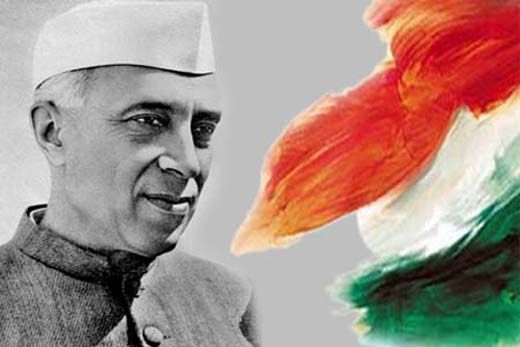Role of Jawaharlal Nehru in India’s Independence
Last Updated At: 10 Jul 2025
6 min read

Pandit Jawaharlal Nehru was more than just India’s first Prime Minister, he was a key leader in the freedom struggle, shaping the nation’s path to independence with vision, courage, and diplomacy. His story is one of commitment, leadership, and nation-building.
In this blog, we explore the role of Jawaharlal Nehru in India’s independence, and how his ideals, strategies, and sacrifices continue to shape the democratic and secular fabric of our nation.
Who was Jawaharlal Nehru?
Pandit Jawaharlal Nehru was an Indian politician, nationalist leader, diplomat, journalist, statesman, anti-colonial nationalist, and author who emerged as the central figure mainly in the Indian Nationalist movements in the 20th century. He played a significant part in India’s fight for freedom from colonial rule. He became the first Prime Minister of independent India.
Jawaharlal Nehru was born on November 14, 1889, in Allahabad to Motilal Nehru and Swarup Rani; he had two sisters, Vijaya Lakshmi Pandit and Krishna Nehru Hutheesing. Vijaya Lakshmi Pandit went on to become the first president of the United Nations General Assembly; Krishna Hutheesing was a renowned writer. His father, Motilal Nehru was also from a political background and served as President of the INC twice.
Nehru was homeschooled by English governesses and tutors till the age of 16, after which he went to England for higher education.
Jawaharlal Nehru: Maker of Modern India
Nehru shot into prominence in 1929, when he presided over the Lahore session where he passed the historic resolution of ‘Purna Swaraj’ or complete independence. He was one of the frontline leaders in in the Indian nationalist movement during the 1930s and 1940s.
He was not only India's first Prime Minister but also the longest serving Prime Minister of the country. In 1955, he was also awarded the Bharat Ratna Award for his stellar role in the freedom struggle and his governance post independence.
We also believe that stories like Nehru’s aren't just to be read in history books they are meant to inspire young minds to think deeply, write creatively, and express themselves with confidence. PlanetSpark's Creative Writing course makes it possible for your child.
Make History Come Alive Through Writing
Empower your child to write with clarity, creativity, and purpose.
Sign up for a free trial of PlanetSpark’s Creative Writing Program and nurture them for future.
The Role of Jawaharlal Nehru in the Struggle for Independence
After completing his education, Jawaharlal Nehru came back to India and became a Barrister. He enrolled at Allahabad High Court, and he started taking an interest in Indian politics. Within no time, he joined the INC and emerged as a leader of a progressive faction in the 1920s.
He got support from Mahatma Gandhi and was called Gandhi’s successor. Later, he became the President of INC in 1929. He started a different movement against the British; in the 1937 Indian provincial elections, Nehru promoted the idea of a secular nation-state. He was fighting for greater autonomy from the British, and because of this, from 1920 to 1930, went to jail numerous times.
He played a significant role in the negotiations around Indian independence, and he supported Gandhi in the salt march in 1930. However, the British punished him for alleged breach of salt law, and he was sent to jail for six months. This protest gathered steam, and both Gandhi and Nehru together led this movement as it was changing the attitudes of Indians.
Nehru’s Legacy in the Freedom Movement
While Mahatma Gandhi is often credited as the spiritual leader of India's freedom struggle, Jawaharlal Nehru was its political architect. His contributions can be summarized as follows:
Bridge between the masses and elite: Nehru’s education and socialist ideals helped bridge the gap between India’s intelligentsia and its common people.
Youth engagement: He was a symbol of modernity and progress, inspiring the youth to join the movement.
Promotion of scientific and industrial growth: Even during the freedom struggle, he spoke of building a nation rooted in science, education, and self-reliance.
Secular values: He upheld the idea of a united India, standing against communal divisions.
International diplomacy: He gave the Indian independence movement a global platform.
Other contributions
Nehru’s contribution to the struggle for independence was critical. He also participated in limited civil disobedience in 1940 with Gandhi. For this, he was sent to jail again for four years. He spent around nine years in jail between 1921 to 1945.
As the rift between Hindus and Muslims increased, in late 1946, this friction killed around 7,000 people, making the subcontinent's partition certain. Although Gandhi never wanted to accept this proposal and was completely against it, Nehru hesitantly accepted it.
Nehru was also against the Muslim League's insistence on the division of India based on religion. The last British viceroy, Louis Mountbatten, advocated the division as the best and most workable resolution, and Nehru was forced to agree.
On August 15, 1947, India and Pakistan became two separate countries, and Nehru became India's first prime minister after independence.

Conclusion
The role of Jawaharlal Nehru in India’s independence is immense and multifaceted. He was not just a freedom fighter but also a thinker, visionary, and statesman. His partnership with Mahatma Gandhi created a powerful synergy that transformed the freedom struggle into a mass movement.
Nehru's legacy is deeply embedded in India’s political, social, and cultural fabric. From mobilizing masses to shaping the democratic structure of free India, his contributions continue to inspire generations.
As India celebrates its freedom, it is important to remember and honor the enduring contributions of Jawaharlal Nehru a leader who dreamed of a just, inclusive, and progressive nation.
Frequently Asked Questions
Q. How did Nehru join the INC?
A. Nehru worked as a barrister in the Allahabad court but did not like this job. Therefore, the same year in 1912, he attended a Congress session and realized that only upper-class elites could join the party.
Yet, he started working for the party and started speaking about independence when most of the people were quiet and satisfied with the constitutional reforms. Then he met Gandhi, and slowly and gradually, his work made him the General Secretary of the All India Congress Committee in September 1923.
Q. When did Nehru meet Gandhi?
A. They met in 1916, and Gandhi was influenced a lot in his first meeting with Nehru.
Q3. When did Nehru become the President of the INC?
A. He became the President in 1946 and remained in the position for the subsequent three terms, which is a record.
Q. How did he work as a Prime Minister?
A. As soon as he became the Prime Minister, he started establishing heavy industries as he thought they could lead to the country's development. He withdrew state boundaries so that trade could be increased. He promoted the usage of Hindi as the country’s official language.
Q. How did Jawaharlal Nehru die?
A. He died on May 27, 1964, due to a heart attack, while in office as the Prime Minister.
Personalized Communication Report
Record a video to get a AI generated personalized communication report for your child
Select Learner's Class

Hi There, want to try these
tips for your child with
LIVE with our expert coach?
Let's check your child's
English fluency
